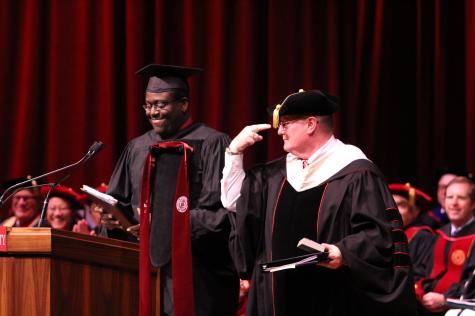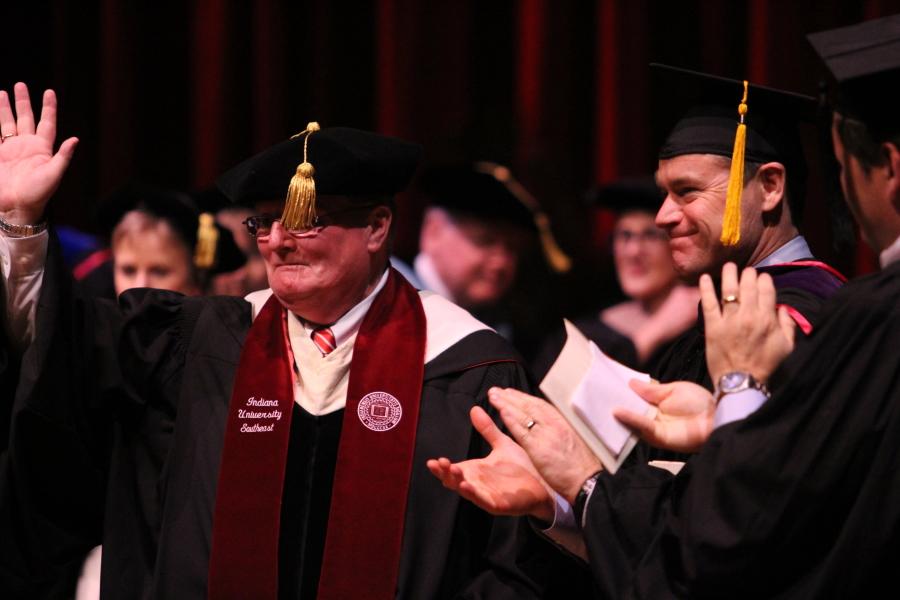Ray Wallace installed as the seventh chancellor of IUS
December 8, 2014
A who’s who of Indiana University was in attendance on Friday, Dec. 5, for the installation ceremony of Ray Wallace. Dressed in robes, tasseled hats and other traditional regalia, members of the administration, faculty and some guests welcomed Wallace as the seventh chancellor of IU Southeast.
With guest speakers that included a U.S. congressman, state senator and a state representative, the ceremony was a culmination of a long and storied career of an Irish immigrant who came to the United States in 1978 on an athletic scholarship and ended up dedicating his life to higher education.
“I was expecting not to feel any great emotion, but as it got closer and closer, there actually was that emotion,” Wallace said. “This is a crowning achievement for me, and to have friends, family and colleagues from all over the state and beyond to see this was a big deal to me.”
The event had its special moments. Student Government Association President Stephon Moore was one of the guest speakers and received a hug from the chancellor after presenting him with a present.
“Your wife said you didn’t have an IU tie yet,” Moore said as he presented the gift.
The climax of the ceremony, the formal installation of the new chancellor, is derived from centuries-old academic customs recognizing the change in leadership. Similar to a knighting ceremony, Indiana University President Michael McRobbie dressed in a red and black robe with a large, gold medallion, placed a crimson sash around the neck of the new chancellor.
Wallace opened his address by commenting on the bagpipers and the brass band playing Irish music. His only complaint, he said jokingly, “not a pint of Guiness to be found.” He went on to talk about Northern Ireland and the trials he faced in finally getting to the U.S.
Wallace talked about coming from a poor family. His parents had very little education, but they realized that education was a way out for their two sons.
“They made huge financial sacrifices so my brother and I could attend a very proper English-styled grammar school,” Wallace said. “They saw that we passed a string of national exams to remain firmly on the university path.”
The sacrifice paid off and the young man who said he once lived in a World War II nissen hut began an academic journey that led him to IU Southeast as a candidate for chancellor.
Wallace was one of four finalists for the position, but McRobbie said in an interview before the ceremony that he was very confident in his decision to hire Wallace.
“His experience in comparable institutions and his previous roles. I think he has a deep understanding of what the role is of a campus like this in a community,” McRobbie said. “As I interviewed the final candidates, without doubt he was far and away the most receptive about what was going to be involved in that role, and plus he had an excellent background and was highly regarded by everyone we spoke to.”
Wallace has officially been chancellor since July 1, and as McRobbie put it, he has “hit the ground running.”
The chancellor has made it very clear that one of his biggest priorities is to eliminate the IU Southeast stigma of being the region’s “best kept secret” and “hidden gem.” He dismissed those ideas as “nonsense.” He talked about that in his address and reiterated it during the reception.
“We are going to completely overhaul recruiting. We are going to look at how we do that, who we do it to, and what packages we send to people,” Wallace said. “If you’re a working adult, we shouldn’t be sending you pictures of 18-year-old kids playing volleyball.”

Time will tell how the chancellor’s new strategies will affect the university and community as a whole, but the ceremony was about new beginnings for the Wallace family. Having just recently settled into a home in Charlestown, Susan Wallace, the chancellor’s wife, said she and her husband are exactly where they want to be.
“This is going to be our home, and my friends know how much that means to both of us,” she said. “Just to be part of a community and to have a vested interest in the people and the university. We’re home.”
